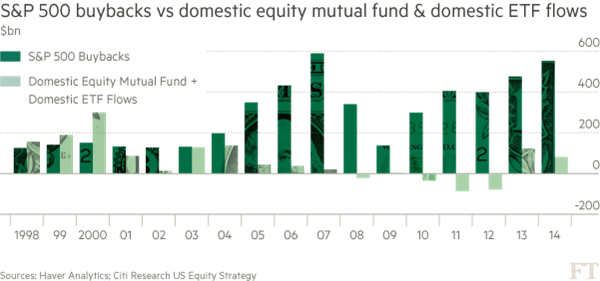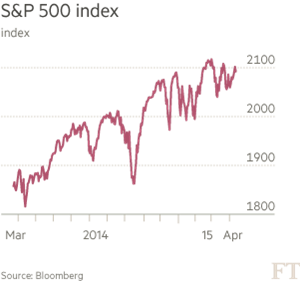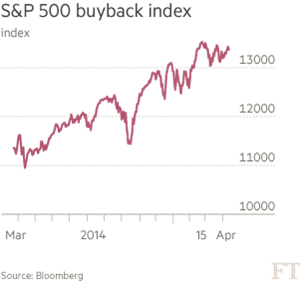|
April 14, 2015 9:58 am
US companies unleash share buyback binge
Eric Platt in London
An ageing US equity bull run retains one major source of buyers these days —
the large companies that dominate the share market including
Apple,
Intel,
IBM and now
General Electric.
No matter the muted interest on the part of US investors, companies are
increasingly upping their purchasing power, helping maintain a bull market
run that over the past six years has left equities looking richly priced.
Buybacks have been a popular way to boost shareholder value for several
decades and help companies offset equity options granted to employees. But
in the current environment of sluggish economic growth, the rising tide of
buybacks and dividends being paid out worries some observers, as it suggests
corporations are less optimistic about future prospects and see a paucity of
long-term investment opportunities.
Strategists have debated the degree to which buybacks have accelerated the
current bull run, with several noting the downturn in Europe would have
probably pushed sovereign wealth funds, pension funds and other
institutional investors into US stocks.
“It’s not a zero sum game and it doesn’t have to be,” says David Lefkowitz,
an equity strategist with UBS Wealth Management. “The flows are not
necessarily indicative of how much support corporate buybacks are lending to
the bull market. If that goes away, I wouldn’t necessarily be concerned
about a downside in equities.”
With investors expecting a big reduction in quarterly earnings growth
compared with a year ago, the return of cash shows no sign of abating, with
GE announcing last week it would
return a massive $90bn over the next three years.
Now the market stands on the cusp of seeing a record of more than
$1tn returned to shareholders in the
form of dividends and stock repurchases this year — with this activity
supporting equity prices and valuations as the benchmark index hovers less
than 1 per cent from a record high.
Qualcomm,
Lowes,
General Motors and
Simon Property have initiated or
authorised multibillion-dollar increases to share buyback programmes in the
past two months, while the financial sector cleared a key hurdle in early
March when the Federal Reserve
gave a green light to dividend
increases and repurchase plans from the country’s largest banks.
Citigroup,
American Express and
JPMorgan led a group of nearly two
dozen financials that committed as much as $50bn to buybacks over the next
five quarters. Attention has now shifted to Apple, the exemplar of share
repurchases, which is expected to announce changes to its multiyear $130bn
programme in late April. Those repurchases are “crucial” to valuations and
earnings growth, Orrin Sharp-Pierson of BNP Paribas says, a point echoed by
Goldman Sachs.
“There is still a very clear preference to receive buybacks as an investor.
You get this sense of perpetual synthetic growth, which investors appreciate
in the presence of little underlying growth,” he says. “And you get a boost
to secondary demand — the stock effect creating the additional bid for
equities has been really quite important.”
Retail investors have been absent from buying US equities, joining
institutions looking to Europe and Asia for growth opportunities. Investors
have pulled $18bn from exchange traded funds invested in US stocks since the
year began, compared with $11bn that has flowed to ETFs investing in
European and Asian equities,
according to data provider Markit.
Tobias Levkovich, a strategist with Citi, notes that over the past decade,
S&P 500 companies have repurchased $4tn worth of shares — in part to offset
stock options offered to employees — while domestic investors have added
less than $100bn to the mix.
“The lack of US retail investor interest in stocks has been stunning and
equity market tops usually consist of overly aggressive individual investor
interest in the asset class,” says Mr Levkovich.
The pace of companies buying back their own shares now accounts for more
than 2 per cent of overall equity volumes in the US and contributed 2.3 per
cent to earnings growth for the S&P 500 last year, according to strategists
with JPMorgan. That figure, the brokerage says, will probably accelerate
this year as a slide in the dollar and oil cut into earnings gains from
underlying operations.
The returns have made valuations more palatable for the S&P 500 — the index
trades at 17.8 times 2015 expected earnings, above its 10-year average — as
analysts ready for two quarters of
earnings declines. Companies on the
US blue-chip index offer a dividend yield of 2 per cent, just above the
yield on the benchmark 10-year Treasury.
US multinationals steadily increasing returns to shareholders have in turn
found stronger buyer interest. Both the S&P 500 buyback and S&P 500 dividend
aristocrats indices have outperformed their namesake over the past 12
months, with the former outpacing the broader blue-chip index by nearly 650
basis points.
“With rates expected to remain low, search for yield to continue, and a
cautious investor base, shareholder-friendly companies with attractive total
yields and strong cash flow generation should benefit from the current
market environment,” says Dubravko Lakos-Bujas, a strategist with JPMorgan.
eric.platt@ft.com
|
© The Financial Times Ltd 2015 |
|


